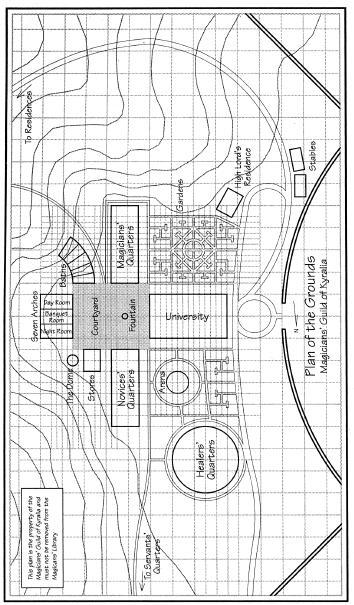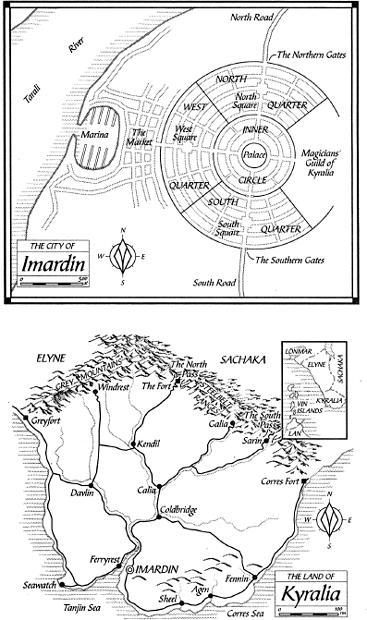The Ambassador's Mission
Trudi Canavan

Maps


PART ONE
Chapter 1
The Old and the New
The most successful and quoted piece by the poet Rewin, greatest of the rabble to come out of the New City, was called
In the darkness of Imardin’s new Quarter a man remembered the poem. He stopped to listen, but instead of absorbing the city’s song he concentrated on one discordant echo. A sound that didn’t belong. A sound that didn’t repeat. He snorted quietly and continued on.
A few steps later a figure emerged from the shadows before him. The figure was male and loomed over him menacingly. Light caught the edge of a blade.
“Yer money,” a rough voice said, hard with determination.
The man said nothing and remained still. He might have appeared frozen in terror. He might have appeared deep in thought.
When he did move, it was with uncanny speed. A click, a snap of sleeve, and the robber gasped and sank to his knees. A knife clattered on the ground. The man patted him on the shoulder.
“Sorry. Wrong night, wrong target, and I don’t have time to explain why.”
As the robber fell, face-down, on the pavement, the man stepped over him and walked on. Then he paused and looked over his shoulder, to the other side of the street.
“Hai! Gol. You’re supposed to be my bodyguard.”
From the shadows another large figure emerged and hurried to the man’s side.
“Reckon you don’t have much need for one, Cery. I’m getting slow in my old age. I should be payin’
Cery scowled. “Your eyes and ears are still sharp, aren’t they?”
Gol winced. “As sharp as yours,” he retorted sullenly.
“Too true.” Cery sighed. “I should retire. But Thieves don’t get to retire.”
“Except by not being Thieves any more.”
“Except by becoming corpses,” Cery corrected.
“But you’re no ordinary Thief. I reckon there’s different rules for you. You didn’t start the usual way, so why would you finish the usual way?”
“Wish everyone else agreed with you.”
“So do I. City’d be a better place.”
“With everyone agreeing with
“Better for me, anyway.”
Cery chuckled and resumed the journey. Gol followed a short distance behind.
Over half the Thieves – the leaders of underworld criminal groups in Imardin – had perished these last few years. Each in different ways and most from unnatural causes. Stabbed, poisoned, pushed from a tall building, burned in a fire, drowned or crushed in a collapsed tunnel. Some said a single person was responsible, a vigilante they called the Thief Hunter. Others believed it was the Thieves themselves, settling old disputes.
Gol said it wasn’t
Of course, younger Thieves had taken the place of the old, sometimes peacefully, sometimes after a quick, bloody struggle. That was to be expected. But even these bold newcomers weren’t immune to murder. They were as likely to become the next victim as an older Thief.
There were no obvious connections between the killings. While there were plenty of grudges between Thieves, none provided a reason for so many murders. And while attempts on Thieves’ lives weren’t that unusual, that they were successful was. That, and the fact that the killer or killers had neither bragged about it, nor been seen in the act.
He’d seen the change coming in the days after the Ichani invaders were defeated, but hadn’t guessed how quickly it would happen. Once the Purge – the yearly forced exodus of the homeless from the city into the slums – ended, the slums were declared part of the city, rendering old boundaries obsolete. Alliances between Thieves faltered and new rivalries began. Thieves who had worked together to save the city during the invasion turned on each other in order to hold onto their territory, make up for what they’d lost to others and take advantage of new opportunities.
Cery passed four young men lounging against a wall where the alley met a wider street. They eyed him and their gaze fell to the small medallion pinned to Cery’s coat that marked him as a Thief’s man. As one they nodded respectfully. Cery nodded back once, then paused at the alley entrance, waiting for Gol to pass the men and join him. The bodyguard had decided years ago that he was better able to spot potential threats if he wasn’t walking right beside Cery – and Cery could handle most close encounters himself.
As Cery waited, he looked down at a red line painted across the alley entrance, and smiled with amusement. Having declared the slums a part of the city, the king had tried to take control of it with varying success. Improvements to some areas led to raised rents which, along with the demolition of unsafe houses, forced the poor into smaller and smaller areas of the city. They dug in and made these places their own and, like cornered animals, defended them with savage determination, giving their neighbourhoods names like Blackstreets and Dwellfort. There were now boundary lines, some painted, some known only by reputation, over which no city guard dared step unless he was in the company of several colleagues – and even then they must expect a fight. Only the presence of

